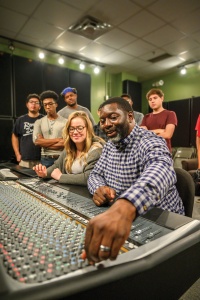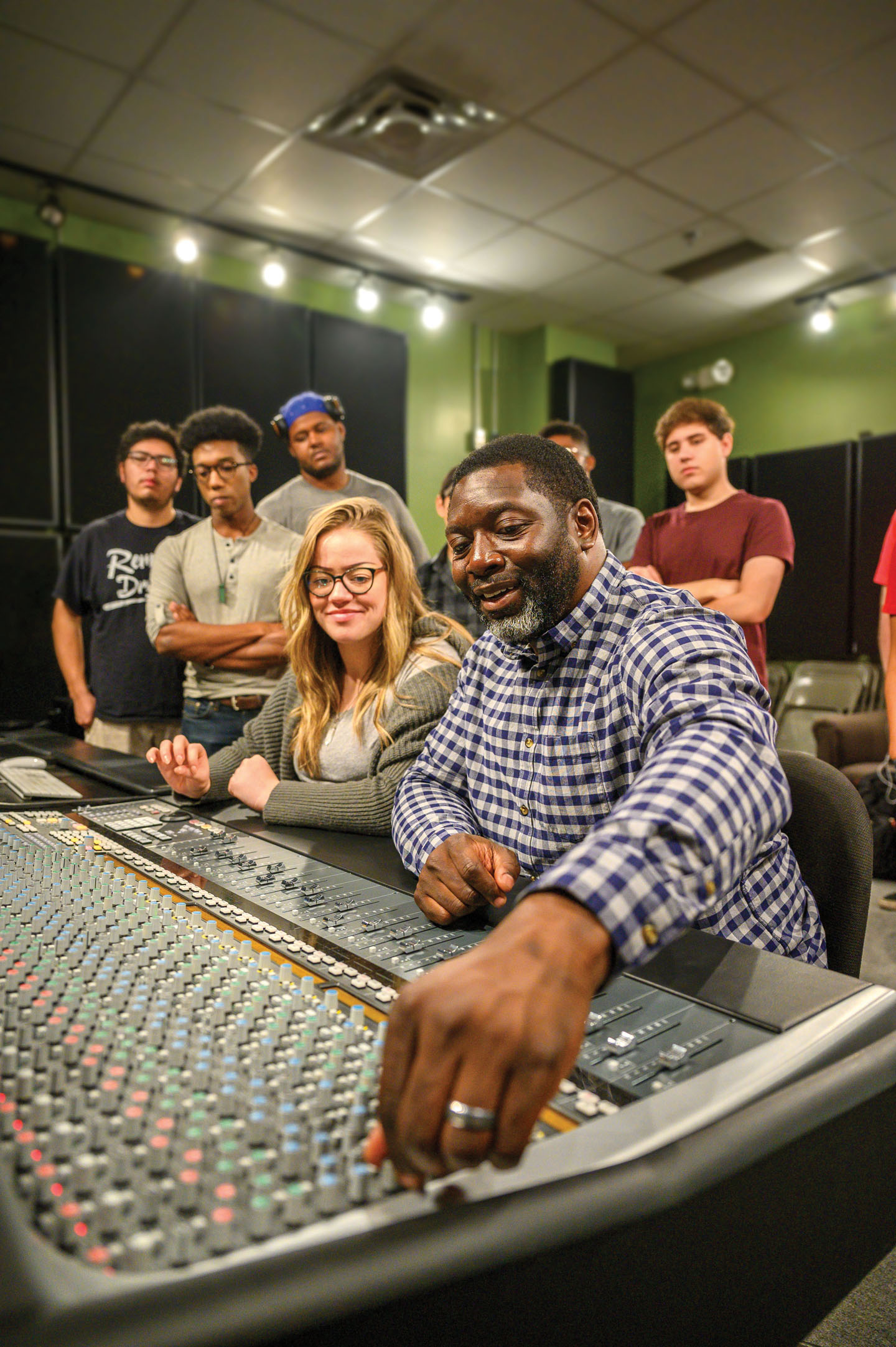
Music may be about do-re-me, but it’s also about dough-re-me. That’s why the University of Texas at Arlington has established a new degree in Music Industry Studies.
“Music is a business and is really a show business – the business of show,” says Jamar Jones, assistant professor of music and the program’s coordinator. “I learned in business school that there is only one principle value that every business has: to increase shareholder wealth. What we want to do is create enterprise, and that takes some of the emotion out of the decisions that are made.”
Jones should know. While still a teenager he produced a song on the Grammy-winning Boys II Men album. He has collaborated with such artists as Patti Labelle, Usher and Kanye West. He earned credit toward his bachelor’s degree online while on tour with Academy Award and Grammy winner Jamie Foxx.
A talented pianist before he was out of grade school, Jones was repeatedly labeled a child prodigy, but a solid upbringing, he says, helped him keep a level head. When he got back home in Philadelphia at 16, flushed with excitement from a week in New York at the Grammys, his mother calmly heard him expound on his adventure and then said, “Tomorrow’s trash day.” He might have been a budding star, but there were chores to be done.
And so his message to students is that it’s wonderful for them to soar creatively as long as they keep their feet on the ground. “Every musician should have some level of business education,” he says, adding that there should be a “balance of needs – our organizational needs vs. our creative desires.”
This dichotomy is reflected in the degree program’s interdisciplinary curriculum. There are core music courses such as theory, harmony and ear training, but there also are courses in the business arena such as accounting, economics, marketing and law.
Jones is an alumnus of UTA, having received his Master of Music in jazz piano in 2017. He began teaching part time then. When the opportunity arose for a full-time position with a music/business emphasis, he looked at the requirements and saw he had the perfect skill set. “I have a master’s in music and a master’s in business and we’re talking the music business,” he says. “It made perfect sense. I had walked into something that felt as if it had been designed for me.”
Business courses aside, music is still at the base of the program. “With our degree you have to be able to sing or perform on an instrument. But the emphasis is not on public performance,” Jones says.
Although some of the courses have been around for years, the degree program kicked off only this fall semester. Twenty students were expected; sixty signed up.
“We have a really dynamic and diverse mix of different types of students,” Jones says. “There are some who want to be performers. There are some who just want to be audio engineers. There are some who want to be music producers. I have one guy who’s planning to go to law school once he graduates. We have some who want to be in marketing, but they just want to understand the music business, the music industry.”
One such student is Kori Burke, who learned piano from her mom in Red Oak and began writing songs when she was around 12. She attended Dallas Baptist University for a couple of years, took time off to be part of the L.A. music scene, then came back and entered UTA as a double major in Music Industry Studies and English. “I want music as my career,” she says, “but I’m a writer first and foremost. “
She wants to write film scores and dreams (“although I know this sounds crazy”) of writing songs for a Disney princess movie.
Her time in California showed her the value of having business sense. “I got to see a lot of ways that people can really get tricked into getting into situations that they didn’t need to be in,” she says. “And it’s a lot harder to know what’s real and what’s not and what parts of a contract are not necessarily useful.”
Fellow student Nick Rood had his entrée into music via the tuba, which he played proudly in the Mansfield Summit High School band, but he has no intention of making it his career.
His goal, rather, is to be a record producer, specifically doing demos for aspiring artists to send to bigger labels. “I’ve always had kind of a soft spot for starving artists,” he says.
Like Burke, he sees the importance of knowing the business side of things. “This degree program is perfect for tackling the importance of the logistical side of the industry,” he says, “because a lot of people can cash in on the fact that so many artists only know music.”
Rood is a classmate of Burke’s in the Record Label and Studio Management class taught by Jones. It’s the fourth time he’s taken it because “you get something new out of it every time.”
Something not new is Jones’ standard first-day-of-class announcement: “If you didn’t know already, you just signed up to be on the staff of a record label.” That’s to tell them that their class project is to take performance(s) all the way from concept to CD. “We pick the departments we’re in, like artist repertoire, production, legal, art,” Rood says. “Jamar’s there if we need him, but he prefers to let us solve the problems.”
This semester’s project is “I’ll Live,” suggested by Burke, who says it’s “essentially finding reasons to live and not die in a generation that’s so focused on depression and suicide.” One of the songs was wrapped up in early October, and the group is on schedule to be finished around mid-November.
About a week beforehand, she says, there will be a concert “to kind of bring awareness to the subject and also, with the album we’re putting out, to reach a lot of people.”
And reaching a lot of people with your music can be good works, as well as good business.
















